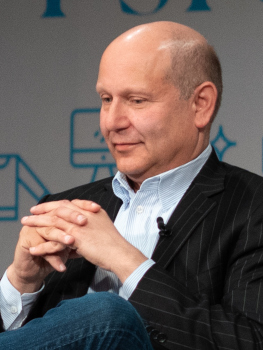

Illumination CEO Chris Meledandri On Original Animation Box Office Struggles, Shifting Audience Tendencies, And Keeping Budgets Down
Illumination founder and CEO Chris Meledandri was a guest on Matthew Belloni’s podcast The Town last week, where the executive answered questions about the state of animation theatrical distribution in a post-Covid world, his studio’s famously low budgets, and his long-term hopes for the company.
When you’ve got half an hour, the full podcast can be streamed for free below, and it’s well worth a listen. In the meantime, we’ve pulled a few key quotes to tide you over.
Post-Covid Market Uncertainties
During their discussion, Belloni pointed out that there hasn’t been an original animated break-out hit since Covid. Asked for his opinion on why, Meledandri replied:

I think that the audience is making its decision about what films it goes to the cinema to see based on the movies that penetrate culture. They don’t have to penetrate culture for the entire audience, but they have to penetrate culture for key demographic or psychographic portions of the audience. So, when you’re starting with something that is unknown, driving that level of urgency is really much more challenging.
That said, Meledandri says that the long development and production cycles of animated features mean time is still needed to see how audiences have changed post-Covid:
I think it’s too early to make a categorical statement about the future of original animation. My belief is that we are learning right now about the changing nature of the audience’s appetite or what defines cultural penetration for them.
How Illumination Keeps Costs Down
Asked about Illumination’s reputation for making blockbusters on budgets far lower than the other big U.S. studios, Meledandri replied by using the company’s upcoming film Migration as an example:
I’m proud of Migration at the budget level of $72 million. But I’d be proud of that movie at any budget. It’s just an exquisitely beautiful movie. And the beauty in that film is a direct result of the artists who are working on the film. And the budgets are a direct result of the artists who are working on the film.
Essentially, Illumination’s budgets are lower because they pay their artists less than other studios. The company can do that because their films are made mostly in France at Illumination Paris Studios (Formerly Mac Guff). Meledandri says that while labor does cost less in France, that’s not why he set up shop there:
There are cost differentials between France and the United States, where our average weekly cost for an animator is less than what an animator would cost here. It’s not the reason I’m in France. The reason I’m in France is that at the time when I started the studio, I could not find enough world class artists available in the United States because competition was too difficult for a startup.
Why Major U.S. Studios Can’t Just Make Cheaper Movies
According to Meledandri, Illumination was able to set a high standard in animation filmmaking at lower costs because the company started from zero and was able to build its culture on a specific budget. He also admitted it’s a constant struggle to keep costs down:
If you create a studio from the starting point, you have expectations that allow you to produce a film for under 80 million dollars. What ends up happening is you have to fight really hard to protect the quality but also, at the same time, not allow the budgets to creep, because budgets naturally creep upward.
That means that established studios can’t just start paying Illumination budgets and get similar results. According to Meledandri:
To try to turn back and reduce budgets within an artistic culture is really, really difficult. You can do it incrementally, slowly, but to do it in an expedited fashion means you’re disrupting the culture of the studio. And that has proven to be very difficult, even though I believe that our competitors have been making strides in that direction.
Building a Brand
Meledandri said that his long-term goal at the studio is to build name recognition to the point that audiences will show up to a film simply because it was produced by Illumination:
I think we’re about at the halfway mark of developing the Illumination brand. It’s not yet at a place where it can change the fate of a movie in any way, shape, or form. We’re roughly at levels that are about half of what Disney and Pixar are at. Which, to me, is a huge accomplishment because we’re vastly younger and have only made a fraction of the movies of Disney.
